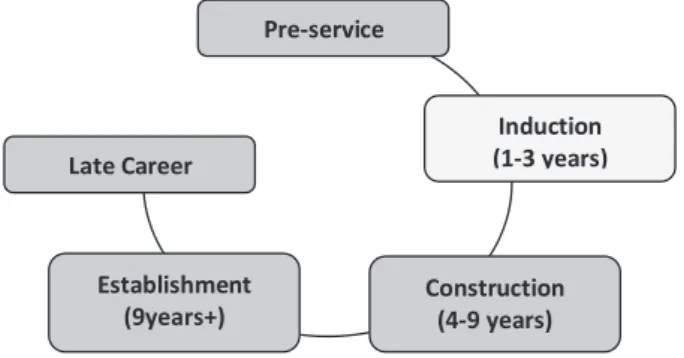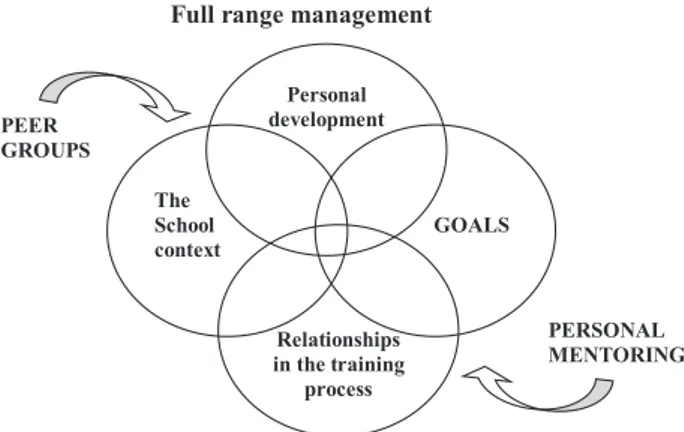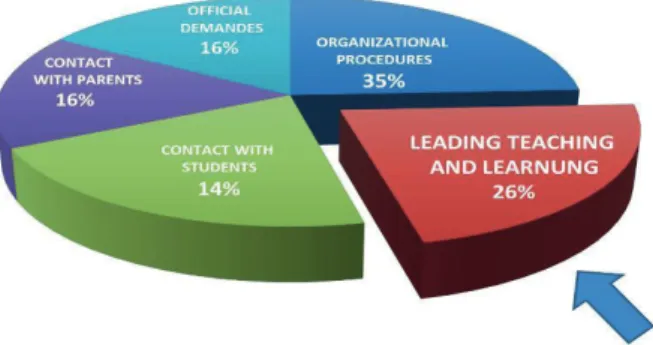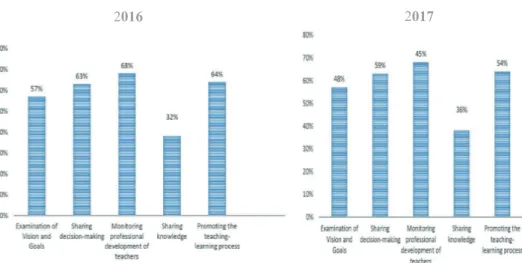MALI NETS
Higher Studies of Israel
FROM DIALOGUE TO A TRAINING FIELD. THE NEXT CHALLENGE OF PROFESSIONAL LEARNING OF NOVICE SCHOOL PRINCIPALS
IN ISRAEL
EFFECTIVE LEARNING FOR SCHOOL PRINCIPALS
In the past four decades the perception of the school principal has under-gone significant changes, from the super hero to a competence approach1. Thus a process of De-Romanization of leadership shifted the focus to teaching skills and knowledge on the time axis of the principal’s carrier as a lifelong learning2. These learning concepts emphasize the specification, learning, and demonstra-tion of those competencies (knowledge, skills, behaviors) that are of central importance to a given task and activity3. As well as the idea of learning to do the right thing in a given situation progressively and collectively over time. Such learning may enable sustainable knowledge and structures, supported by coherent culture4. A steadily greater amount of evidence is increasingly finding correlation between the school achievements and the instructional leadership, especially in the formation of a quality and professional cadre of teachers in the schools as leaders of school pedagogy5. Implementation of this concept of 1 L. Kremer-Hayon, R. Fessler, The Inner World of School Principals: Reflections on Career Life
Stages, „International Review of Education” 1992, no. 38(1), p. 35–45.
2 Development and Learning in the Role: Report of the Professional Committee for the Formation of Recommendations for Policy on the Topic of Development and Learning of Schools Principals in the State of Israel, Avnei Rosha Institute, Israel 2008.
3 I. Mathibe, The Professional Development of School Principals, „South African Journal of
Educa-tion” 2007, no. 27 (3), p. 523–540.
4 L. Stoll, R. Bolam, A. McMahon, M. Wallace, S. Thomas, Professional Learning Communities: A Review of the Literature, „Journal of Educational Change” 2006, no. 7(4), p. 221–258.
5 K. Leithwood, C. Day, P. Sammons, A. Harris, D. Hopkins, Seven Strong Claims about Successful School Leadership, NCSL, Nottingham 2006.
learning requires a clear model and a modus operandi, as long with flexibility and depth that allow to choose between a wide range of action channels and repertoire6.
PROFFESIONAL DEVELOPMENT OF NOVICE SCHOOL PRINCIPALS IN ISRAEL
The career stage approach is the conceptual framework of the current novice principal’s development program. This approach, holds a developmental percep-tion7 that sees the principal as a person who develops on the time axis through dis-tinct stages, that were defined in different variations by a number of researchers. The synthesis suggested by Oplatka constitutes the theoretical framework of the present training program of novice school principals in Israel while the vision of instructional leadership is the core of the program applied to the system on 20088.
Figure 1. Stages of the Career (Oplatka, 2004)
The fundamental assumption of the program holds that the principals need to experience life-long learning in following areas:
1. Implementation of processes of teaching and learning, which is the princi-pal’s main and most important areas of activity.
2. Shaping of the picture of the school’s future – the vision and management of the school.
6 M. West, D. Jackson, A. Harris, D. Hopkins, Learning through Leadership, Leadership through Learning, [in:] Leadership for Learning, ed. K. Riley, K. Seashore-Louis, Jossey–Bass, San
Fran-cisco 2000.
7 E. Drago-Severson, Leading Adult Learning: Supporting Adult Development in our Schools,
Thousand Oaks, CA Corwin Press, New York 2013.
8 I. Oplatka, Learning the Principal’s Future Internal Career Experiences: An Assessment of a Unique Principal Preparation Programme in Israel, „International Journal of Educational
Man-agement” 2009, no. 23(2), p. 129–144. Pre-service Induction (1-3 years) Late Career Establishment
3. The leadership and professional development of the staff.
4. Management of the relationships between the school and the community. Two mechanisms support the current perception of training: peer learning and mentoring which is based on interpersonal interaction that focuses on both person-al and professionperson-al development. The basic assumption is that the school principperson-al needs ongoing personal support during his career9, primarily in the first years of his way in management. Novice school principals in the first two years study in peer groups and receive professional guidance from mentors. The Israeli training program is examined and evaluated every year in an attempt to trace its effec-tiveness. The last assessment carried out in 2017 in the Northern District shows significant gaps between the perception of the new principal as an instructional leader and the applications of this perception to his practical work in the field. In 2008 Israel has formally adopted this integrative approach that is based on the concept of full management cycle of learning, as shown below.
Figure 2. „Full management cycle of learning” (Avnei Rosha, 2009)
IMPLEMENTATION OF THE VISION OF INSTRUCTIONAL LEADER – CURRENT DATA
The latest assessment of the training program which took place in 2017 is fertile ground for a renewed discussion about the perception of training and learn-ing methodologies. The assessment focused on four main parameters: Participants in the learning processes, perceptions of principals on the importance of the en-gagement in select contents10, the distribution of the time dedicated to different 9 Y. Harpaz, Teaching and Learning in a Community of Thinking: The Third Model. Springer
Sci-ence & Business Media, Dordrecht–Heidelberg–New York–London 2013.
10 K. Hammerness, L. Darling-Hammond, J. Bransford, J. Berliner, M. Cochran-Smith, M.
McDon-ald, K. Zeichner, How Teachers Learn and Develop, [in:] Preparing Teachers for a Changing
Personal development GOALS The School context Relationships in the training process PEER GROUPS PERSONAL MENTORING Full range management
management practices and the contributions of the learning to the core needs of principals in the field.
What can be learned from the survey on the realization of the vision of instruc-tional leadership? There is a very impressive datum concerning the attendance of novice principals at the learning processes. A critical mass of 96% principals par-ticipate regularly in the learning processes. Despite the impressive participation, the survey points to gaps between inputs and outputs in many other aspects. Thus for example, the vision of instructional leadership that emphasized the principal’s direct engagement in the teaching and learning processes does not meet the test of reality. It is possible to see that only 26% of the time is dedicated to this topic, while greater time is dedicated to administrative procedures inside and outside of the school. This question was examined in the 2016 evaluation process, in which a similar figure of 22% of the new principals reported that they had little involve-ment in the pedagogic process in the school, which is reinforced by the data on the quite a number of principals engaged in organizational procedures (See fig. 3).
Figure 3. The Distribution of the Time Dedicated by the Principals to Different Management Practices
Moderate percentages were measured in the reporting of management practic-es that promote other aspects of instructional leadership. Thus, for example, only 32% of the principals in 2016 and 36% in 2017 reported that they allot time for sharing knowledge which is one of the main elements in organizational leadership and professional promotion of teachers. Another datum indicates that less than two- thirds of the principals participate in the promotion of teaching and learn-ing processes. Moreover, as can be seen from the data, there has been a certain decrease in reporting on practices related to monitoring the professional develop-ment of teachers as well as the other parameters examined (See fig. 4).
World: What Teachers Should Learn and Be Able To Do, ed. L. Darling-Hammond, J. Bransford,
Figure 4. The Percentage of School Principals Who Are Promoting Aspects of Instructional Leadership
An additional and significant datum also points to the gaps between the im-portance attributed by principals to the learning of certain subjects, and the contri-bution of the peer learning process and personal guidance to their competence and skill in these areas. Here we can see that there is a gap of almost 30% in the con-tribution of learning to the Instructional leadership practices. As well as an even larger gap of almost 40% in the contribution of learning to dealing with complex situations (2016). In comparison, it can be seen that the data are relatively similar in the two assessment processes in relation to the contribution of learning. For example, only a slight decrease was seen in the gap measured in the contribution of learning to the Instructional leadership practices in 2017. As well as a signifi-cant increase in the rate of those reporting of even larger gap of almost 52% in the contribution of learning to dealing with complex situations (See table 1).
Table 1. The Importance of the Engagement in Selected Contents and The Contributions of the Learning
Selected Contents for Learning
The Importance of the Selected
Contents
The Contributions of
the Learning The Gap
2016 2017 2016 2017 2016 2017
School assessment 79% 69% 63% 50% 16% 19%
Leadership, management and professional
deve-lopment of the staff 84% 87% 62% 59% 22% 28%
Learning climate 78% 86% 60% 61% 18% 25%
Instructional leadership 83% 72% 54% 52% 29% 20%
Focus on the individual 71% 73% 53% 56% 18% 17% Vision and management
of the change 68% 66% 42% 38% 26% 28%
Dealing with complex
si-tuations 84% 89% 36% 37% 48% 52%
Relations with the Mini-stry of Education and the
community 59% 54% 36% 35% 23% 19%
As noted, the data indicate a structured gap in the training program in terms of examining the practical impact of learning on field practices. At the same time, the greatest gap was found in the high rate of general satisfaction of the new school principals and their instructors with the program and its results. Contrary to these findings surprisingly, both principals and mentors report high satisfaction in 2016 and 2017 relatively. Which is not reflected, as we have seen, in the report on practices in the field. Both school principals and their mentors reported that the program was relevant to them, contributes to their reflective thinking and allows them to improve capabilities and efficacy. The data clearly show that mentors see a great contribution of their work to school principals. In addition, there is recog-nition of the added value of the program to develop their management skills as experienced school principals (See table 2).
Table 2. Overall satisfaction with personal training
Overall satisfaction with personal training
2016 2017
Principals
(N=68) Mentors(N=59) Principals(N=55) Mentors(N=43) The meetings dealt with issues relevant to
the needs of a new school principal 92% 100% 52% 57%
I received pedagogic and managerial tools
that could serve me in my work at school 85% 87% 51% 25%
The process has given me reflective
thin-king about my managerial work 97% 100% 52% 100%
The personal guidance contributed to my
managerial ability 85% 88% 27% 25%
FAMILIAR CHALLENGES IN A NEW ORIENTATION
The understanding that there is no coherence between the findings in the eval-uation process regarding the effectiveness of the training program, led to a deci-sion to reform the process of mentoring. The system has adopted a new approach
to learning. This new approach is characterized by responsibility, commitment to results, accountability and compliance with defined objectives and goals11. It is drawn from the world of personal training and emphasizes elements of repeated practice of practical skills that enable school principals to strengthen their man-agerial capacities12. The GROW model13 will be apply the system in 2019. This required a substantial change disposition of school principals and mentors attitude of professional interaction among them14.
Figure 5. Coaching leadership learning through partnership (Jan Robertstone, 2009)
Decision makers hope that the change that will bring about a dialogue aimed at achieving goals will certainly be more focused15. The assumption is that there will be a shift from the orientation of a non-binding „peer-talk” to a joint pursuit of goals. The program represents a paradigmatic change, which emphasizes the importance of dialogue as a means of achieving concrete goals, and not only as a professional and personal sphere for meeting dilemmas the reform will apply at the national level, and will be obligatory to all the training processes of novice school principals16.
SUMMARY
The article reviewed in short the main challenges of the professional develop-ment program for novice school principals. This national attempt to sharpen the demand for training programs for new school principals is consistent with other 11 P. Lewis, R. Murphy, New Directions in School Leadership, „School Leadership and
Manage-ment” 2008, no. 28(2), p. 127–146.
12 K. Leithwood, A. Harris, D. Hopkins, Seven Strong Claims about Successful School Leadership,
„School Leadership and Management” 2008, no. 28(1), p. 27–42.
13 J. Robertson, Coaching leadership learning through partnership, „School Leadership and
Man-agement” 2009, no. 29(1), p. 39–49.
14 J.B. Ciulla, The Ethics of Leadership, Thomson Wadsworth, Belmont 2003.
15 T. Waters, R.J. Marzano, & B. McNulty, Balanced Leadership: What 30 Years of Research Tells Us about the Effect of Leadership on Student Achievement, A Working Paper, 2003.
16 R.F. Elmore, Building a New Structure for School Leadership, Albert Shanker Institute,
Wash-ington 2000.
GOAL- What goals have been
defined?
REALITY- What does the situation in reality show about achieving
the goal?
OPTIONS- What are the possible
alternatives to achieving the goal
WHEN/WHAT/ WRAPUP -What do you do to promote your
reforms in the system. Most of them are intended to increase the accountability and commitment to achievements and to improve the work of principals in the management of school pedagogy17. Expanding the repertoire of the principal’s practices, as well as practicing managerial actions in a systematic, focused and clear manner, can increase the productivity and effectiveness of management in the field18.
At the same time, it is important to understand that such reform touches upon substantial parts of the role of the Personal Guide. The system will need to be reoriented and to practice new discourse skills in a training practices19. It is impor-tant to keep in mind that these are principals of peer schools and not coaches and trainees. The basic assumption that the adoption of a “new instructional language” alone may lead to far-reaching consequences must be examined from a time per-spective20.
The essential question regarding how do principals gain practical skills that affect directly upon their instructional leadership, is still puzzling at all levels. Further research is needed to better understand what principals need at every stage of their role21.
REFERENCES
Ciulla J.B., The Ethics of Leadership, Thomson Wadsworth, Belmont 2003.
Day C., Bakioglu A., Development and Disenchantment in the Professional Lives of Headteachers, [In:] Teachers’ Professional Lives, ed. I.F. Goodson, Routledge, London 1996.
Development and Learning in the Role: Report of the Professional Committee for the Formation of Recommendations for Policy on the Topic of Development and Learning of Schools Principals in the State of Israel, Avnei Rosha Institute, Israel 2008.
Drago-Severson E., Leading Adult Learning: Supporting Adult Development in our Schools, Thou-sand Oaks, CA Corwin Press, New York 2013.
Elmore R.F., Building a New Structure for School Leadership, Albert Shanker Institute, Washington 2000.
Friedman Y., Self-Management for the Increase of the Level of Achievements of the School:
Self-Di-rection, Effectiveness and Accountability, Position paper submitted to the General
Administra-tion of the Ministry of EducaAdministra-tion, Israel 2010.
17 S. Voreg, Y. Barzon, Instructional Leadership in Israel – Evaluation and Prediction of Student Achievements, Avnei Rosha Institute, Jerusalem 2013.
18 J.P. Spillane, R. Halverson, J.B. Diamond, Investigating School Leadership Practice: A Distrib-uted Perspective, „Educational Researcher” 2001, no. 30(3), p. 23–28.
19 L. Stoll et al, Professional Learning Communities..., op. cit., p. 221–258.
20 T. Waters, R.J. Marzano, B. McNulty, Balanced Leadership: What 30 Years of Research Tells Us about the Effect of Leadership on Student Achievement. A Working Paper 2003.
21 Y. Friedman, Self-Management for the Increase of the Level of Achievements of the School: Self-Direction, Effectiveness and Accountability. Position paper submitted to the General
Fuller F.F., Brown O.H., Becoming a Teacher, [in:] Teacher Education. The 74th Yearbook of the
National Society for the Study of Education (Part 2), ed. K. Ryan, University of Chicago Press,
Chicago 1975.
Hammerness K., Darling-Hammond L., Bransford J., Berliner D., Cochran-Smith M., McDonald M., Zeichner K., How Teachers Learn and Develop, [in:] Preparing Teachers for a Changing
World: What Teachers Should Learn and Be Able To Do, ed. L. Darling-Hammond, J.
Brans-ford, Jossey-Bass, San Francisco 2005.
Harpaz Y., Teaching and Learning in a Community of Thinking: The Third Model. Springer Science & Business Media, Dordrecht–Heidelberg–New York–London 2013.
Kremer-Hayon L., Fessler R., The Inner World of School Principals: Reflections on Career Life
Stages, “International Review of Education” 1992, no. 38(1).
Leithwood K., Day C., Sammons P., Harris A., Hopkins D., Seven Strong Claims about Successful
School Leadership, NCSL, Nottingham 2006.
Leithwood K., Harris A., Hopkins D., Seven Strong Claims about Successful School Leadership, „School Leadership and Management” 2008, no. 28(1).
Lewis P., Murphy R., New Directions in School Leadership, „School Leadership and Management” 2008, no. 28(2).
Mathibe I., The Professional Development of School Principals, „South African Journal of Educa-tion” 2007, no. 27(3).
Oplatka I., Learning the Principal’s Future Internal Career Experiences: An Assessment of a Unique
Principal Preparation Programme in Israel, „International Journal of Educational
Manage-ment” 2009, no. 23(2).
Oplatka I., The School Principal in Late Career: An Explorative Inquiry into Career Issues and
Expe-riences in the Pre-Retirement Working Years, „Leadership and Policy in Schools” 2007, no. 6(4).
Robertson J., Coaching leadership learning through partnership, „School Leadership and Manage-ment” 2009, no. 29(1).
Spillane J.P., Halverson R., Diamond J.B., Investigating School Leadership Practice: A Distributed
Perspective, „Educational Researcher” 2001, no. 30(3).
Stoll L., Bolam R., McMahon A., Wallace M., Thomas S., Professional Learning Communities:
A Review of the Literature, „Journal of Educational Change” 2006, no. 7(4).
Voreg S., Barzon Y., Instructional Leadership in Israel – Evaluation and Prediction of Student
Achievements, Avnei Rosha Institute, Jerusalem 2013.
Waters T., Marzano R.J., McNulty B., Balanced Leadership: What 30 Years of Research Tells Us
about the Effect of Leadership on Student Achievement, A Working Paper 2003.
West M., Jackson D., Harris A., Hopkins D., Learning through Leadership, Leadership through
Learning, [in:] Leadership for Learning, ed. K. Riley, K. Seashore-Louis, Jossey–Bass, San
Francisco 2000.
Author: Mali Nets
Title: From dialogue to a training field. The next challenge of professional learning of novice school
principals in Israel
Keywords: School principals in Israel, career stages, professional development of school principals,
effective learning
Discipline: Pedagogics Language: English Document type: Article
Summary
Year 2008 was a dramatic turning point in Israel concerning the professional development of school
principals. This shift is reflected in the conception of the principal as an „instructional leader”22, thus
Israel has formally adopted the integrative approach to principal development that emphasizes prin-cipal’s work in the post-modern era alongside the development of individual „managerial identity”; and the reflective abilities to strengthen implicit knowledge23. The professional development of
nov-ice principals provides a significant touchstone in the examination of the new training program that has been underway for the tenth year. This program assisting novice principal through two central mechanisms: peer support and personal guidance provided by veteran and retired principals. Key data from the evaluation of the training program for the novice principals in the Northern District will be presented. The main challenges of the current training program will be discussed, with ques-tions to consider changes to increase the impact of personal guidance on the managerial capabilities of novice school principals24.
22 I. Oplatka, The School Principal in Late Career: An Explorative Inquiry into Career Issues and Experiences in the Pre-Retirement Working Years, „Leadership and Policy in Schools” 2007, no.
6(4), p. 345–369.
23 C. Day, A. Bakioglu, Development and Disenchantment in the Professional Lives of Headteach-ers, [In:] Teachers’ Professional Lives, ed. I.F. Goodson, Routledge, London 1996, p. 205–227. 24 F.F. Fuller, O.H. Brown, Becoming a Teacher, [in:] Teacher Education. The 74th Yearbook of the
National Society for the Study of Education (Part 2), ed. K. Ryan, University of Chicago Press,





